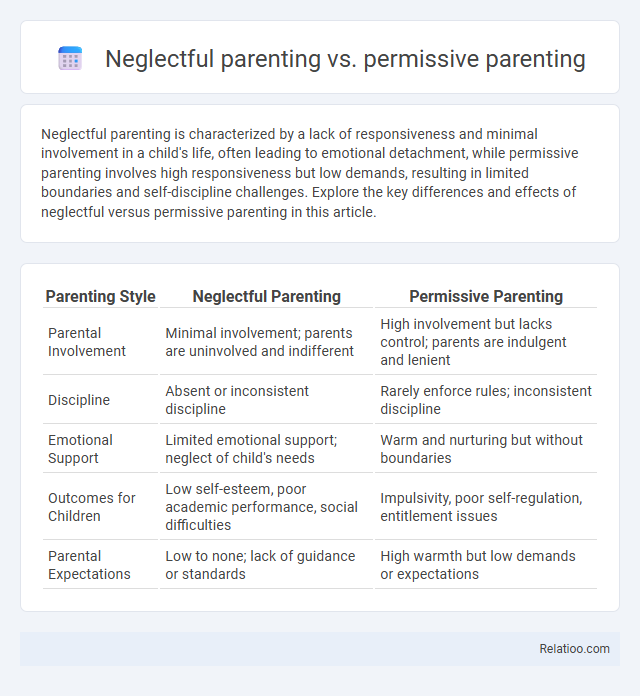Neglectful parenting is characterized by a lack of responsiveness and minimal involvement in a child's life, often leading to emotional detachment, while permissive parenting involves high responsiveness but low demands, resulting in limited boundaries and self-discipline challenges. Explore the key differences and effects of neglectful versus permissive parenting in this article.
Table of Comparison
| Parenting Style | Neglectful Parenting | Permissive Parenting |
|---|---|---|
| Parental Involvement | Minimal involvement; parents are uninvolved and indifferent | High involvement but lacks control; parents are indulgent and lenient |
| Discipline | Absent or inconsistent discipline | Rarely enforce rules; inconsistent discipline |
| Emotional Support | Limited emotional support; neglect of child's needs | Warm and nurturing but without boundaries |
| Outcomes for Children | Low self-esteem, poor academic performance, social difficulties | Impulsivity, poor self-regulation, entitlement issues |
| Parental Expectations | Low to none; lack of guidance or standards | High warmth but low demands or expectations |
Understanding Neglectful Parenting
Neglectful parenting is characterized by a lack of responsiveness to a child's needs, often resulting in emotional unavailability and insufficient supervision or support. Unlike permissive parenting, which is indulgent and overly lenient, neglectful parenting involves an absence of involvement and care, leading to potential developmental and behavioral issues in children. Understanding neglectful parenting is crucial for recognizing the signs of emotional neglect and promoting healthier family dynamics that support your child's well-being and growth.
Defining Permissive Parenting
Permissive parenting is characterized by high responsiveness and low demands, where parents are indulgent and rarely enforce rules or discipline, prioritizing your child's freedom over structure. Neglectful parenting, by contrast, involves low responsiveness and low demands, marked by a lack of involvement or attention to the child's needs. Understanding the distinctions between these styles helps in recognizing the impact of parental behavior on a child's emotional development and self-discipline.
Key Differences Between Neglectful and Permissive Parenting
Neglectful parenting is characterized by a lack of responsiveness and minimal involvement in a child's life, leading to emotional neglect and unmet basic needs, whereas permissive parenting involves high responsiveness but low demands and control, often resulting in inconsistent discipline and boundary setting. You can observe that neglectful parents fail to provide necessary guidance and support, while permissive parents are overly indulgent and avoid enforcing rules. Key differences include the level of parental involvement and the approach to discipline, impacting a child's emotional development and behavior regulation differently.
Emotional Impact on Children
Neglectful parenting, characterized by emotional unavailability and lack of supervision, often leads to children experiencing feelings of abandonment, low self-esteem, and difficulties in forming secure attachments. Permissive parenting, marked by high warmth but low discipline, can result in children struggling with self-regulation, impulsivity, and challenges in respecting boundaries. The emotional impact of neglectful styles generally manifests as withdrawal and insecurity, whereas permissive approaches may foster anxiety due to inconsistent guidance and lack of structure.
Behavioral Outcomes in Children
Neglectful parenting often leads to children exhibiting low self-esteem, poor social skills, and increased risk of mental health issues due to the lack of parental involvement and guidance. Permissive parenting tends to result in children displaying impulsive behavior, difficulty with authority, and poor self-discipline because of the absence of consistent boundaries. Both parenting styles contribute to maladaptive behavioral outcomes, but neglectful parenting is more strongly associated with emotional detachment and academic underachievement.
Long-term Effects on Development
Neglectful parenting often leads to attachment issues, low self-esteem, and difficulties in emotional regulation, severely impacting Your child's social and cognitive development over time. Permissive parenting may result in poor self-discipline, impulsivity, and challenges with authority, increasing the risk of behavioral problems and academic struggles. Neglect, characterized by a lack of responsiveness to a child's needs, causes lasting developmental delays, emotional insecurity, and increased vulnerability to mental health disorders.
Signs and Symptoms of Each Parenting Style
Neglectful parenting is characterized by a lack of responsiveness, emotional unavailability, and minimal supervision, often leading to children displaying low self-esteem, poor social skills, and academic challenges. Permissive parenting involves high responsiveness but low demands, resulting in children who may exhibit impulsivity, difficulty following rules, and problems with authority. Both parenting styles contribute to behavioral issues, but neglectful parenting typically causes more severe emotional detachment and developmental delays, while permissive parenting often leads to lack of self-discipline and increased risk-taking behaviors.
Risk Factors Leading to Neglectful or Permissive Parenting
Risk factors leading to neglectful parenting include parental substance abuse, chronic mental health issues, and extreme socioeconomic stress, all of which reduce caregivers' emotional availability and supervision. Permissive parenting often arises from a lack of consistent discipline and boundaries, frequently linked to parental anxiety about conflict or overindulgence due to guilt or low self-efficacy. Both neglectful and permissive parenting styles can result from inadequate social support networks and unresolved trauma, increasing the likelihood of impaired child development and behavioral problems.
Strategies for Healthier Parenting Approaches
To foster healthier parenting approaches, implementing consistent boundaries and responsive communication in place of neglectful or permissive styles enhances emotional security and development. You can promote positive behavior by combining clear expectations with empathy and active involvement in your child's life. Regularly reflecting on your parenting style and seeking support or education improves your ability to meet your child's emotional and physical needs effectively.
Resources and Support for Parents
Resources and support for neglectful parenting focus on increasing parental engagement through counseling, parenting classes, and community programs aimed at improving child supervision and emotional involvement. In permissive parenting, resources emphasize setting boundaries and promoting consistent discipline with the help of workshops and family therapy that encourage balanced authority and warmth. Tailored interventions combining educational materials, social services, and mental health support effectively address the distinct challenges of both neglectful and permissive parenting styles.

Infographic: Neglectful parenting vs Permissive parenting
 relatioo.com
relatioo.com